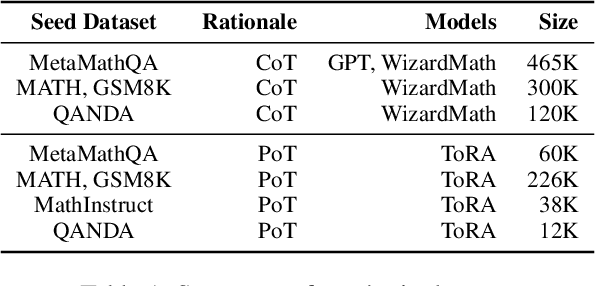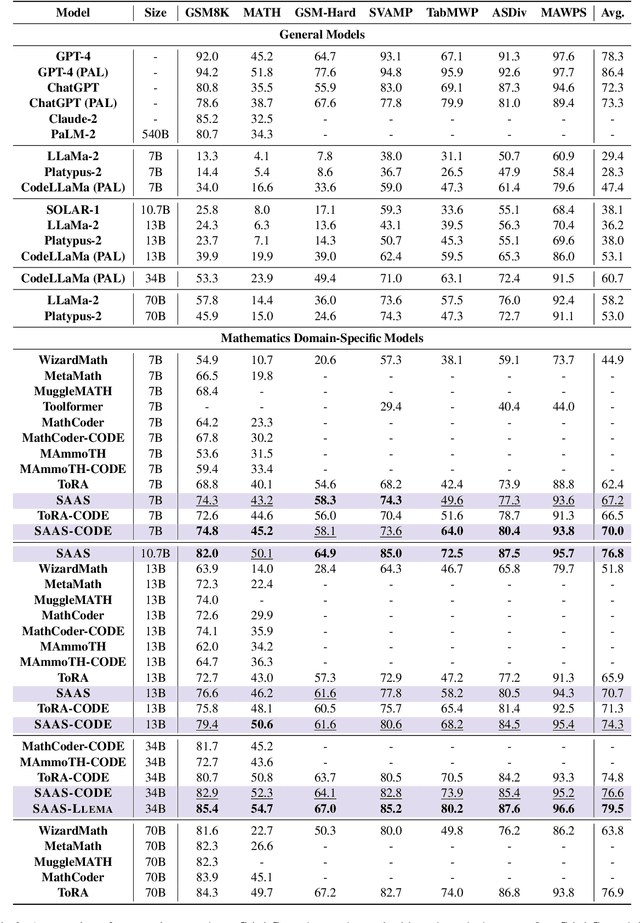Gyoungjin Gim
Solar Open Technical Report
Jan 11, 2026Abstract:We introduce Solar Open, a 102B-parameter bilingual Mixture-of-Experts language model for underserved languages. Solar Open demonstrates a systematic methodology for building competitive LLMs by addressing three interconnected challenges. First, to train effectively despite data scarcity for underserved languages, we synthesize 4.5T tokens of high-quality, domain-specific, and RL-oriented data. Second, we coordinate this data through a progressive curriculum jointly optimizing composition, quality thresholds, and domain coverage across 20 trillion tokens. Third, to enable reasoning capabilities through scalable RL, we apply our proposed framework SnapPO for efficient optimization. Across benchmarks in English and Korean, Solar Open achieves competitive performance, demonstrating the effectiveness of this methodology for underserved language AI development.
SAAS: Solving Ability Amplification Strategy for Enhanced Mathematical Reasoning in Large Language Models
Apr 08, 2024



Abstract:This study presents a novel learning approach designed to enhance both mathematical reasoning and problem-solving abilities of Large Language Models (LLMs). We focus on integrating the Chain-of-Thought (CoT) and the Program-of-Thought (PoT) learning, hypothesizing that prioritizing the learning of mathematical reasoning ability is helpful for the amplification of problem-solving ability. Thus, the initial learning with CoT is essential for solving challenging mathematical problems. To this end, we propose a sequential learning approach, named SAAS (Solving Ability Amplification Strategy), which strategically transitions from CoT learning to PoT learning. Our empirical study, involving an extensive performance comparison using several benchmarks, demonstrates that our SAAS achieves state-of-the-art (SOTA) performance. The results underscore the effectiveness of our sequential learning approach, marking a significant advancement in the field of mathematical reasoning in LLMs.
Dataverse: Open-Source ETL Pipeline for Large Language Models
Mar 28, 2024Abstract:To address the challenges associated with data processing at scale, we propose Dataverse, a unified open-source Extract-Transform-Load (ETL) pipeline for large language models (LLMs) with a user-friendly design at its core. Easy addition of custom processors with block-based interface in Dataverse allows users to readily and efficiently use Dataverse to build their own ETL pipeline. We hope that Dataverse will serve as a vital tool for LLM development and open source the entire library to welcome community contribution. Additionally, we provide a concise, two-minute video demonstration of our system, illustrating its capabilities and implementation.
SOLAR 10.7B: Scaling Large Language Models with Simple yet Effective Depth Up-Scaling
Dec 29, 2023



Abstract:We introduce SOLAR 10.7B, a large language model (LLM) with 10.7 billion parameters, demonstrating superior performance in various natural language processing (NLP) tasks. Inspired by recent efforts to efficiently up-scale LLMs, we present a method for scaling LLMs called depth up-scaling (DUS), which encompasses depthwise scaling and continued pretraining. In contrast to other LLM up-scaling methods that use mixture-of-experts, DUS does not require complex changes to train and inference efficiently. We show experimentally that DUS is simple yet effective in scaling up high-performance LLMs from small ones. Building on the DUS model, we additionally present SOLAR 10.7B-Instruct, a variant fine-tuned for instruction-following capabilities, surpassing Mixtral-8x7B-Instruct. SOLAR 10.7B is publicly available under the Apache 2.0 license, promoting broad access and application in the LLM field.
 Add to Chrome
Add to Chrome Add to Firefox
Add to Firefox Add to Edge
Add to Edge